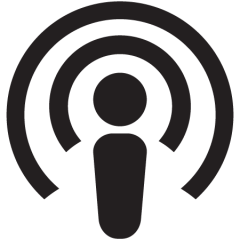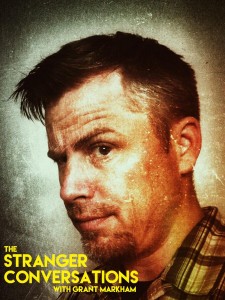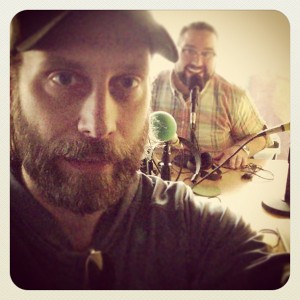
Wikipedia defines “Podcast” as a “digital medium that consists of a episodic series of audio, video, digital radio, PDF, or ePub files subscribed to and downloaded through web syndication or streamed on-line to a computer or mobile device.” Merriam-Webster defines “Podcast” as “a program (as of music or talk) made available in digital format for automatic download over the Internet.”
Meanwhile, I define it in the simplest terms as an “on-demand radio program.”
I recently appeared on my first podcast, The Stranger Conversations with Grant Markham, and I listen to podcasts both big and small. But having heard Grant and his buddy, Jason The Angry Ginger, as well as Neil and Annaleis from Dark Angels & Pretty Freaks, discuss the differences between a “professional” podcast and an “indie” podcast, I’m left with the plain old question of “What is a podcast?”
For some context, Grant, Jason, Neil, and Annaleis have at one point or another on their respective podcasts had a discussion about the differences between professional podcasts and indie podcasts.
From what I have gathered, in what I have actually heard them all say on their own podcasts and sometimes on each other’s podcasts, the difference between professional and indie podcasts is all behind-the-scenes in the production. For example, Marc Maron, Chris Hardwick, and Kevin Smith all have professional podcasts because they record then hand it off to someone else to edit and upload. On the flip side of that, guys like Grant, Jason, Neil and Annaleis do it all themselves.
But I’m not sure I buy it. When not doing it on the road, Maron records his WTF with Marc Maron in his garage… His garage! Of course his garage is set up as a studio, but then again, Jason The Angry Ginger has a studio set up in his basement known affectionately as Monkey Poo Studios. So the only difference there would be that Maron probably has more equipment, or at least more expensive equipment, AND he has a producer.
But there’s a problem with that logic, because Jason has a producer, as does Grant! Whether they understand it consciously or not they are each other’s producers. A producer helps you move your stories and content along, allowing it to build and grow. And they do that for each other.
So it must be about the money then, right? Well, that may well be, but on the other hand, I don’t think Jason or Grant or Neil and Annaleis are going to say “no” to sponsorship. They may say no to a sponsor who asks them to change their format or their voice, but Maron and Smith got sponsors without changing their voice or their format. If any changes occurred there, they happened naturally as their shows grew, not because a sponsor asked them to.

Any kid with a smartphone can be a superstar
What I’m getting at is that if any kid can become a YouTube superstar with their smartphone, surely the lines between professional and indie podcasts have been blurred for a while. And with podcasting still being in it’s relative infancy, it’s still the wild west out there, and I’m becoming a believer that there isn’t a difference.
Yet, there is… And that difference isn’t equipment, or sponsors, or format, it’s time. Do you know how I know that? Because Smith and Mosier sounded very independent at the beginning, very rough and unpolished, as did Maron and Hardwick and anyone else you happen to listen to.
The difference is time. The more they podcast, the smoother they get. The rough edges go away until someone who stumbles onto their podcast hears it and thinks, “Hey, this sounds professional!”
The right equipment can only get you so far and most of it can be afforded by anyone willing to take the time to even record a podcast. It’s finding your voice. It’s finding your format and your audience for your podcast. It’s making it your own. That’s the difference. There are no “indie” podcasts, just new ones still being recorded and released with the rough edges still in tact. Some are technical edges that can be edited out in time, as they learn the editing process, but for the most part, it’s just being comfortable being yourself with the record button on.
If you need proof, just listen to a podcaster’s first few podcasts. And I mean FIRST few podcasts. For example, Jason and Grant grew as podcasters during their 76-episode run of The Last Podcaster Standing. So if you listen to their current endeavors of Seven Days a Geek, The Stranger Conversations, Podcasting 101, etc, etc, they were polished before they even started them.
What I’m trying to say is that for podcasting, there isn’t an indie or a professional. There are “rookies” and “veterans,” for sure. For the ones that make it, the ones that last, they’re bound to find themselves and reach that professional plateau. What they do from there is up to their own ambition.
However, I will tell you that NOT everything found on iTunes or Stitcher is a podcast. Repackaged radio programs are NOT podcasts. What’s the difference? Intent. I don’t fault NPR for releasing their shows minus the station breaks as podcasts, but they are not what they’re advertised to be.
The intent of a podcast it to tell a story, to educate, or to illuminate, which is what radio does. While the intent of radio may in fact be the same, it differs in its audience. Podcasts, at least the good ones, look to expand their community, while repackaged radio programs are looking for a broader audience.
For example, as a listener of FEaB, Nerdist, Seven Days a Geek, SModcast, The Stranger Conversations, and WTF with Marc Maron, to name a few, I can tell you that all of them are looking to expand their communities. And as a listener, I can tell you that I belong to all of those communities and that makes me feel like every podcast is being released for me. Repackaged radio isn’t like that. It’s being released for audience growth.
So maybe I’m out here in left field, preaching to the grass while the ball gets hit my way, or maybe not. Maybe this will end the debate on what the differences are between independent and professional podcasts. But this is just one podcast listener’s views… Maybe you’re a fellow listener and you disagree, or maybe you’re a podcaster and YOU disagree as well. That’s your problem.
For me, I’ll continue to be a podcast junkie and I’ll enjoy every podcast and the community I am a part of by listening. And for those of you who know what I’m talking about and understand what it’s like to be a part of those podcast communities, you know there’s nothing else like it.
Either you understand it or you don’t. Either way, this my attempt at ending the debate.
However, one thing is certain, this new medium of podcasting is growing exponentially in studios, basements, garages, and wherever else someone puts on a headset and talks into a microphone. It may be young and we may not know what the media landscape will look like in the future, but podcasting is here and I believe it is here to stay.



